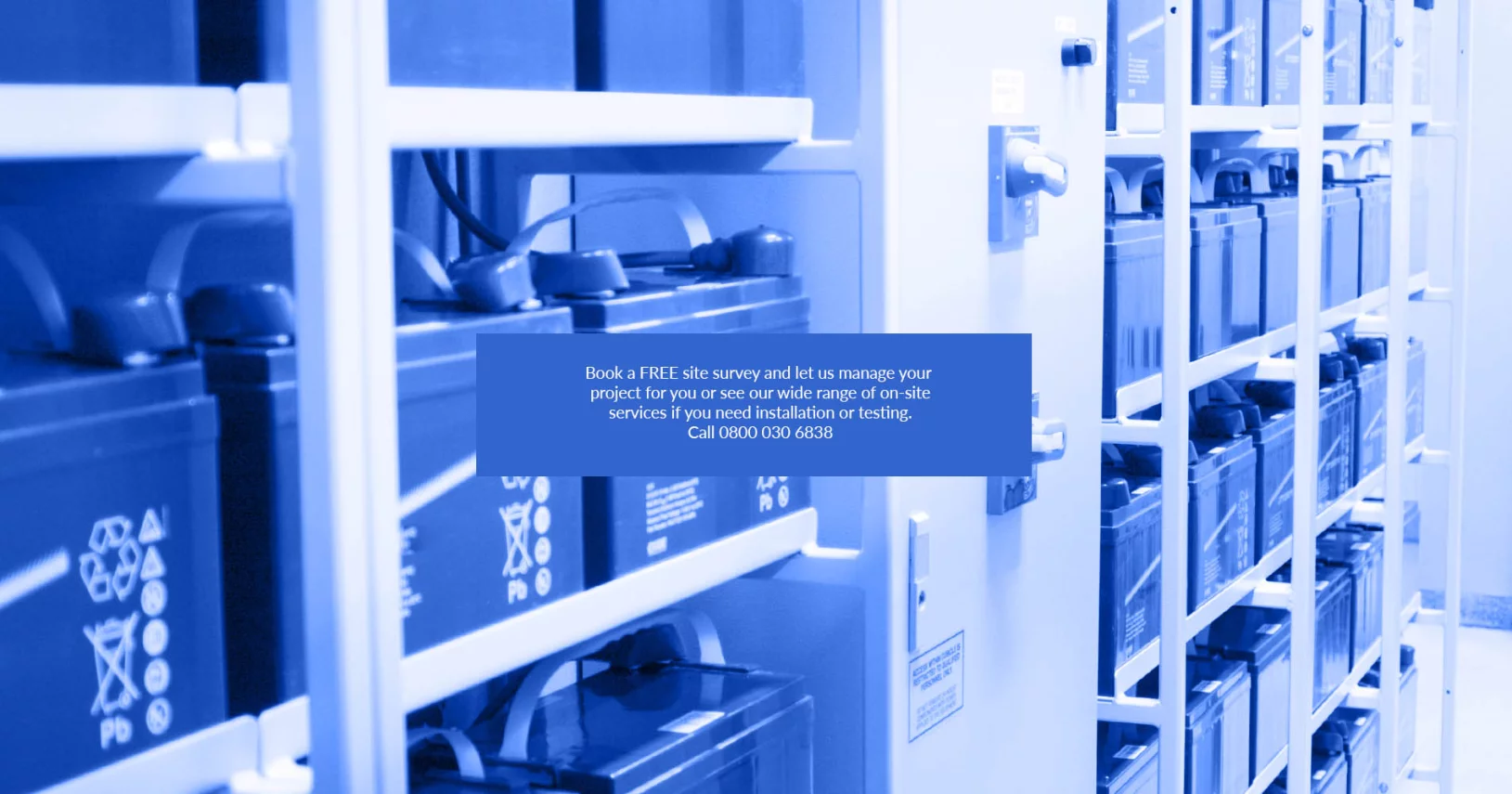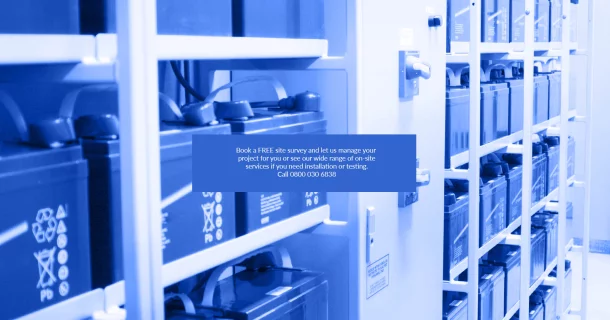Most uninterruptible power supplies include automatic battery testing which typically takes place every 24hours and is a very short-term test of the entire battery set connected. Whilst this gives a good indication as to the state of the batteries we also recommend individual battery block testing during a preventative maintenance visit using a conductance measuring handheld battery tester. Results can be recorded over each visit and compared to identify weak battery blocks. Over several visits handheld UPS battery testing provides a very accurate picture as to the state of the batteries and their health.
UPS Battery Installation Services
Over 80% of UPS failures are due to battery ageing and poor battery management, testing and replacement regimes. At Server Room Environments our power engineers are trained and certified to work on both AC and DC power installations, allowing us to provide a complete range of battery installation services for uninterruptible power supplies, emergency lighting, energy storage systems, security panels and standby power systems.
- AC Unit Maintenance
- Air Conditioner Repairs
- Battery Installations
- Cabling Installations
- Cleaning Services
- Cooling Site Surveys
- Data Centre Maintenance
- Disposals and Recycling
- Electrical Installations
- Fire Suppression Services
- Generator Services
- Hire and Rental
- Load Bank Testing
- Monitoring Support Plans
- Project Management
- Removals and Relocations
- Room Integrity Tests
- Server Relocations
- Smart Hands
- Structured Cabling
- Technical Support
- Thermal Camera Surveys
- UPS Installations
- UPS Maintenance
- UPS Site Surveys
Battery Services
Our complete range of battery related services available includes:
- Battery inspection and testing
- Battery build and electrical installation
- Battery replacement kits
- Removals and eco-friendly disposal
Batteries have a finite working life which can be limited through usage and environmental factors. To book a battery service please complete the enquiry form or call us on 0800 030 6838.
Commercial UPS Batteries
The battery in a commercial UPS system is typically a type known as a Valve Regulated Lead Acid (VRLA). This type of battery is used in various systems including security panels and sizes can range from several Ampere-hours (Ah) to several hundred.
A VRLA battery will typically have a 5-year or 10-year design life. In reality, this means that the battery will under normal environmental and usage circumstances require replacement around years 3-4 and years 7-8 respectively.
A VRLA battery provides power through a chemical interaction process (lead and acid) and are designed for standby rather than continuous duty applications. The working life of a VRLA battery is based on a number of charge/discharge cycles (typically 300-400) and operation within a recommended ambient temperature of 20-25°C. For every 1 degree rise above 30°C battery life halves.
In a UPS system the batteries are arranged in a battery string. A modern uninterruptible power supply will automatically test the battery string every 24 hours and alarm if there is a suspected problem with the battery string voltage and performance.
A UPS system will not be able to test each individual battery block or cell. This requires a specialist UPS battery testing service.
Industrial UPS Batteries
Industrial UPS systems may also use lead acid battery technologies but may be based on larger wet cells that have a design life of 10-15 years or more. Outside Europe there is also a demand for NiCad batteries due to their long working life and temperature tolerance.
Lithium-ion Battery Installations
Lead acid batteries are compatible with UPS installations as the battery technology is suitable for standby power applications. The battery set should recharge to 80% within 24 hours following a complete discharge and then be trickle/float charged to full capacity.
In an energy storage system, the battery set must be selected for its ability to charge and discharge multiple times. The most appropriate battery technology for this type of application is a Lithium-ion (Li-ion) battery.
Lithium-ion batteries are designed for multiple charge/discharge cycles over a short time period but must be installed with a specialist Li-ion battery monitoring system which automatically monitors the health of each battery and adjust the battery charging characteristics to prevent thermal issues.
For energy storage and lithium battery installations, Synchronised Power provide battery build and installation services.
UPS System Battery Testing
Our projects team use a hand-held battery tester to test and record the results of individual batteries in a string. As each battery has a unique identifier and the results are stored in the Cloud for analysis, the overall health of a battery can be assessed over time.
The handheld battery testers used by our power engineers are advanced microprocessor-based systems that use algorithms for conductance and impedance testing and chemical analysis. This type of battery testing technology generates far more comprehensive information than a traditional impedance tester and provides predictive information on the overall health and lifespan of a battery block.
One of the benefits of individual battery testing is the opportunity to identify batteries failing early and their potential need for replacement. The overall discharge performance of a battery string is always limited by the weakest battery. A second benefit is a lengthening of the time between battery replacements. Regular battery testing can help to lengthen the overall working life of the battery set allowing the site to run its batteries for longer periods between replacement.
Whilst a commercial UPS system is generally inspected during preventative maintenance annually, we recommend battery testing on a 6month basis for critical sites and/or especially during the latter stages of a battery installation’s life.
Fixed installation battery monitoring systems can also be installed by Synchronised Power. These is a permanent monitoring system with each battery block installed with an individual battery monitor which is then connected via a communications panel to a battery management/monitoring system to allow the data to be collected and analysed.
Battery Load Bank Testing
Our projects team can arrange for load bank hire during the commissioning or maintenance of an uninterruptible power or standby power system. The load bank places a dummy load on the power device for testing purposes.
UPS Battery Installation Accessories
In addition to providing battery installation services, our projects team can also source and install battery isolators and battery transition boxes which are used to connect two or more battery strings to an uninterruptible power supplied.
Battery Testing Prices and Availability
Our power engineers are available for battery testing at normal working hours (NWH) and Out-of-Hours (OoO) and Weekend/Bank Holiday rates. We provide a day or half-day rate dependent upon the number of UPS systems to be tested and the number of battery blocks per geographic location.
Battery Test Reports
Following a site battery test our power engineers will analyse the test data and provide a report detailing:
- Individual battery block results
- Temperature readings
- DC voltage report with graphs
- Environmental observations
- Battery room health & safety observations
- Security observations
- Visual system inspection
Our projects team can also provide replacement UPS batteries for installation on site. We also supply individual kits for smaller UPS systems using battery ‘plug-and-play’ connectors.
Battery Testing Regimes
There are two forms of battery testing within the UPS and standby power industries:
- Conductance Testing: which provides indication of the ability of a battery to ‘conduct’ or generate energy. Regular testing and the recording of results provides an overview of the overall health of a battery block and can help plan for future replacements before the battery reaches its end of life or shows visible signs of heat damage from a rising internal resistance (swollen plastic case and white residue around the terminals. The unit of measure for conductance is Mhos or Siemens.
- Impedance Testing: which measures battery internal resistance. As a battery ages, the plates sulphate leading to an increased resistance and the potential heat damage within the battery itself. Measuring the internal resistance provides an indication of how near a battery is to failure.
Conductance testing is a true measure of the ability of a battery block’s ability to generate energy as it is predictive. Impedance testing is more commonly used for older batteries when it is easier to identify performance issues as the batteries approach their end-of-life and usefulness.
For more information on our battery installation, testing and replacement services please contact our projects team.

Earn SRE points on all online purchases with double points on selected products































